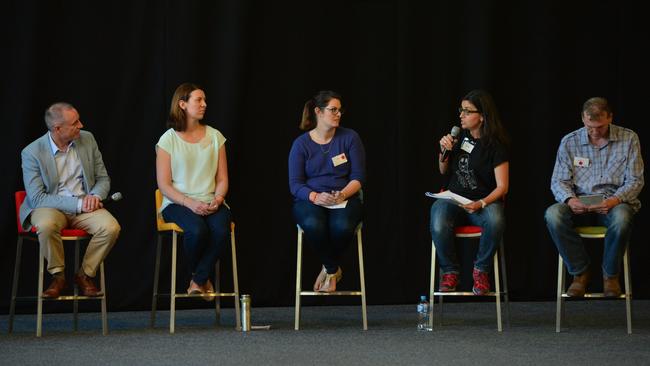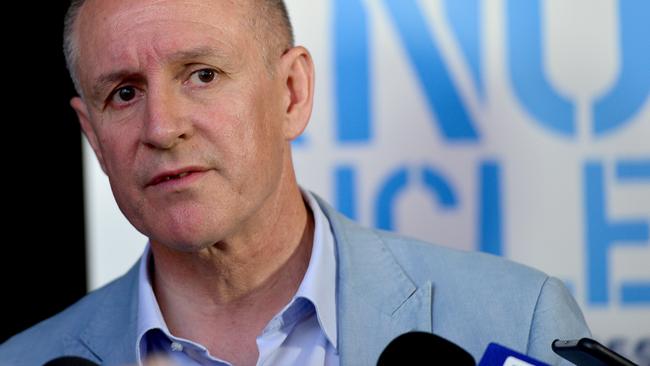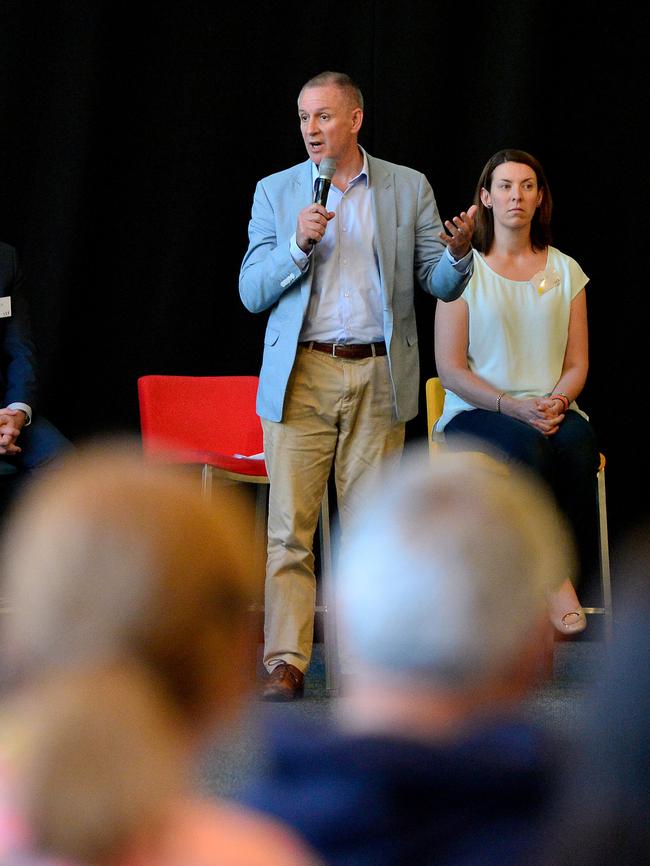Citizens’ jury overwhelmingly rejects nuclear waste storage facility for South Australia
UPDATE: Premier Jay Weatherill says “no decision has been taken” about continuing with or abandoning nuclear storage, after a cabinet meeting today. READ THE FULL REPORT
SA News
Don't miss out on the headlines from SA News. Followed categories will be added to My News.
- What should happen next? Take our survey and have your say
- ANALYSIS: Verdict leaves Government’s grand plan in tatters
- Citizens’ jury releases first report into nuclear waste dump
- Finland waste storage site would share technology with SA
- Should we spend $600m just for a nuclear waste plan?
PREMIER Jay Weatherill says “no decision has been taken” about continuing with or abandoning nuclear storage, after a cabinet meeting today.
Mr Weatherill said the government had several other sources of feedback to consider, as well as a highly-negative citizens’ jury that rejected the idea over a “lack of trust”.
Mr Weatherill said other factors to be considered included online and in-person feedback, as well as a community survey and parliamentary inquiry.
“All of these matters should be taken into account,” he said. “The government will be in a position to make a decision about these matters very soon, and will make that decision public about how we progress, or not.”
Mr Weatherill said the jury decision would be given “substantial weight” in the final government position to be announced to Parliament before the end of the year.
“These are judgments we are yet to make,” he said.
NUCLEAR DOSSIER: All your questions answered
“We haven’t reached a position on that, but we will give substantial weight to the deliberations of the jury because it was an important part of the process and it deserves to be respected.”
As reported in The Advertiser today, the jury rejected the idea of nuclear waste storage in South Australia by an overwhelming two-thirds majority.
In a deep blow to advocates of nuclear storage, which a Royal Commission found could earn the state about $100 billion in profits, the jury cited a “lack of trust” as the deal-breaker.
It said it was sceptical of the State Government’s ability to deliver the project safely and on-budget, as well as the sincerity of the jury process they had been asked to take part in.
“The jury generally had a strong conviction in taking a position,” the report of its 350 members states.
“Two-thirds of the jury do not wish to pursue the opportunity under any circumstances.”
CLICK HERE to read the full report
Mr Weatherill personally received the report from the citizens’ jury at the Adelaide Convention Centre just after 5pm on Sunday. But he would not concede the proposal was now dead.
The objections to the proposal ranged from the Government’s perceived poor record in managing big projects like construction of the new Royal Adelaide Hospital and the historic State Bank collapse, to the lack of consent from Aboriginal communities.
“No market testing and understanding the appetite with potential customers for the use of, and at what fee, for an Australian repository, is a reason not to undertake further expenditure and investigation,” the report states.

“Continuing the investigation ... with evidence of lack of consent and poor economics, demonstrates this as an agenda of the government.”
Mr Weatherill said the “very clear position” of the jury would be combined with other Government research about the statewide views of the nuclear industry, as cabinet considers whether to push ahead.
“All of those perspectives need to be weighed up,” Mr Weatherill said.
“This is a massive and controversial decision that took Finland about 38 years to take. We don’t expect that this is a debate that will be concluded any time soon.”
This morning Mr Weatherill told ABC 891 the jury’s rejection of the plan was just one aspect of the process and the debate would continue.
“There’s no path forward unless there’s community consent and indeed specific local community consent ... that’s been the experience all around the world,” Mr Weatherill said.
Mr Weatherill said he thought the jurors had faith in the process but didn’t necessarily trust some of the information, or the government’s ability to regulate or manage a facility.
He said another reason jurors were against the proposal was the attitude and concerns of traditional land owners.
“The reason for the no’s were probably a little bit different from what most people might imagine,” Mr Weatherill said.
“There’s no doubt that there’s a massive issue of trust in government, I could sense that, that’s why we started the whole citizen’s jury process because there is no way forward unless we overcome those issues.”
Mr Weatherill has previously said he would present a formal government position to Parliament by the end of the year, which he expected to be an “amber light” of “proceed with caution”.
The jury was a group of 350 SA residents who were randomly selected and weighted as a community cross-section. It received in-depth briefings from experts on the Royal Commission.
SA Unions secretary Joe Szakacs, who has spearheaded a push within Labor against pursing a high-level storage industry, said Mr Weatherill must now “stand up for SA, and not be hoodwinked into becoming the fall-guy for the multinational nuclear industry”.
“Everyday South Australians have concluded that the argument in favour of storing the world’s nuclear waste is flawed, and a bad deal for our state,” Mr Szakacs told The Advertiser.
“The magnitude of opposition from the jury shows just how politically damaging this could be for the Premier. People know a dud deal when then see it, and that’s exactly what this is.”


Business SA chief executive Nigel McBride said fear had triumphed over facts, and he feared the jury had heard a skewed view from green activists determined to kill further inquiry.
“They ran an absolutely undiluted campaign of fear and misinformation,” Mr McBride said.
“The people who were going to die in a ditch over this were the naysayers, the rest of us were calling for an informed investigation and exploration and to keep that dialogue open. It’s disappointing. An extraordinary amount of effort and resources and time has gone into it.”
Friends of the Earth Australia national nuclear campaigner Jim Green said the judgment of the jury must be respected, and it had seen through a “pro-nuclear bias” in the Royal Commission.
“South Australians do not want the state turned into the world’s nuclear waste dump,” he said.
“The Premier has repeatedly said that he will respect the jury’s decision, and now he must rule out any further work and any further expenditure of taxpayers’ money beyond the $10 million already wasted on his ill-considered nuclear frolic.”


